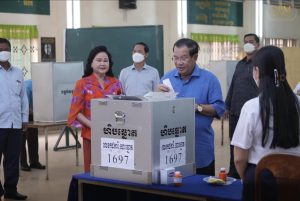Cambodia’s election authority has released the official results of the country’s commune/sangkat elections, confirming the lopsided victory of Prime Minister Hun Sen and the ruling Cambodian People’s Party (CPP).
The National Election Committee (NEC) announced yesterday that the CPP had received 74.3 percent of the vote at the June 5 election, followed by the opposition Candlelight Party (CLP) at 22.3 percent, proportions roughly in line with the provisional results it released in the aftermath of the poll. The remaining slice of the vote was split between a number of micro-parties. For the CPP, this translated into 1,648 of the country’s 1,652 commune chief positions, with the CLP clinching the remaining four.
The election committee said 80.19 percent of the country’s 9.2 million registered voters had cast ballots at the local polls, which elect chiefs and councilors for the country’s communes and sangkats, the level of administration above the village.
This was a remarkably high level of participation for an election whose result was in many ways pre-ordained. The CPP has a near-monopoly on power, which it has wielded to destructive effect since the last commune election in 2017, when the opposition Cambodia National Rescue Party (CNRP) managed to win 43.8 percent of the vote – a similar proportion to what it won at the national election of 2013.
The CPP responded by arresting the CNRP’s president, Kem Sokha, for treason and banning the party, driving most of its leadership into exile. The government opened a second front against the country’s independent press and civil society groups. This left the CPP free to run virtually unopposed in the 2018 national election, in which it “won” all 125 seats in the National Assembly, as well as inheriting the commune/sangkat positions of the outlawed CNRP.
Given the CPP’s stranglehold on the machinery of the state, the Asian Network for Free Elections predicted ahead of the election that it would fall far short of being “fair, credible, transparent, inclusive, and peaceful.” In the aftermath of the election, the CLP also claimed that the election was marred by fraud, vote-buying, and other electoral regularities.
The CLP is the latest incarnation of the party founded in 1995 by opposition figure Sam Rainsy, who has been living in exile since late 2015, and has claimed the mantle of successor to the CNRP. But Hun Sen’s government has since the election made it clear that its seemingly more relaxed attitude toward the political opposition does not extend to the full suite of political freedoms.
On June 14, lawyers acting on behalf of the government sued Son Chhay, the CLP’s vice president, for “seriously damaging” the reputation of the ruling party. His crime? Pointing out the obvious disadvantages facing Cambodia’s opposition parties, from the obvious pro-government bias of the NEC to the widespread vote-buying and political pressure that accompanies each election cycle.
The same day, a Phnom Penh court sentenced 31 opposition activists to lengthy prison terms for incitement and plotting against Hun Sen’s administration – unfinished business from the political crackdown of the last election cycle. This included the arrest of the prominent Cambodian-American legal activist Theary Seng, who has since been transferred to a remote prison in northern Cambodia, presumably to make it harder for her to receive legal and consular advice.
Authorities in Kampong Thom province also arrested a freshly elected CLP commune chief – one of just four from the opposition party – on the basis of a 2002 “robbery.” The arrest warrant against Nhim Sarom was issued in 2012, but only enforced on June 21.
All of this points to the tightly circumscribed nature of the CPP’s new political dispensation. Indeed, one reason that the government allowing the reactivation of the CLP late last year is that it widened the fissures between the political camps of Sam Rainsy and Kem Sokha, whose parties had merged to form the CNRP in 2012 and whose unity had undergirded the party’s successes. This fissure has now widened out into a seemingly unbridgeable gulf, removing, at least for now, the threat of a unified opposition mounting a challenge to Hun Sen’s power.
Cambodia’s veer away from the brink of de jure one-party rule has stopped far short of a meaningful embrace of the principle of popular sovereignty. The CLP has been granted a limited freedom of maneuver, strictly fenced and patrolled, beyond which it will need to proceed with extreme caution.

































